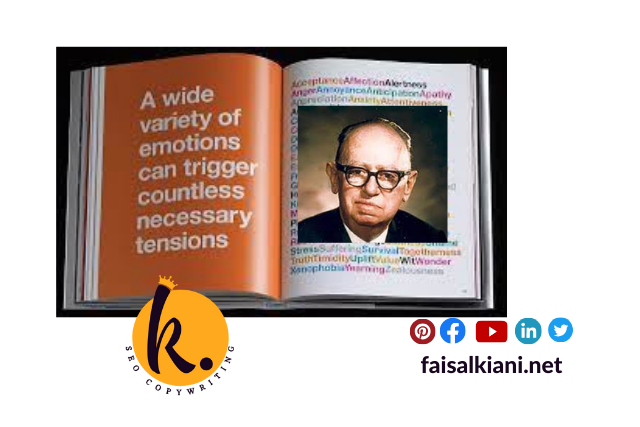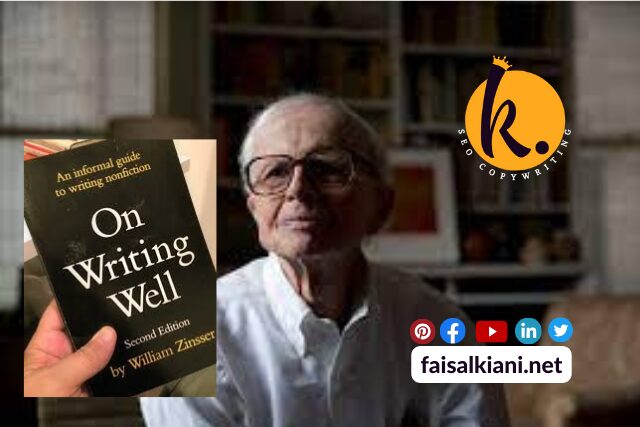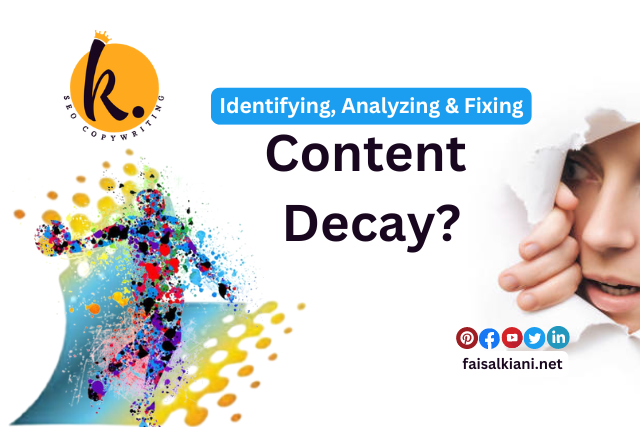The world of copywriting quotes is all about crafting words that resonate, persuade, and ultimately drive results. But sometimes, even the most seasoned copywriters need a little inspiration.
Here, I’ve compiled a collection of powerful copywriting quotes from industry leaders, categorized to fuel your creative fire and elevate your writing:
Collection of Powerful Copywriting Quotes

These powerful copywriting quotes are famous and used as the best guide in the copywriting world.
On the Power of Words
Bill Bernbach (Advertising Legend)
“The most powerful element in advertising is the truth.”
– Bill Bernbach (Advertising Legend)
This means that people trust ads the most when they’re honest and tell the truth about the product. It’s like making a new friend – you gotta be real with them, or they won’t trust you!
So, next time you write an ad, make sure you’re being honest about what you’re selling.
David Ogilvy (Advertising Guru)
“Nobody reads ads. People read what interests them, like a newspaper headline. When your advertisement resembles headline news, people will read it.”
– David Ogilvy (Advertising Guru)
This means people don’t like boring ads! They only read ads that grab their attention, just like exciting headlines in a newspaper.
So, your ad needs to be interesting and make people want to read more, just like a cool news story!
William Zinsser (Writer & Editor)
“Don’t write for people who can read, write for people who can scan.”
– William Zinsser (Writer & Editor)
Imagine you’re flipping through a magazine – you don’t read every single word, right? This quote means you should write your ad so it’s easy to skim through and understand the main point quickly.
Short sentences and clear words are key!
Al Ries & Jack Trout
“You have to sell the sizzle, not the steak.”
– Al Ries & Jack Trout (Marketing Strategists)
This is a fun saying that means you shouldn’t just focus on the features of a product (like the “steak”), but on the benefits it offers (like the “sizzle”).
Think about how the product makes someone feel or what problems it solves – that’s the sizzle!
Roy Peter Clark (Writing Teacher)
“Clarity is king.”
– Roy Peter Clark (Writing Teacher)
This simply means your writing needs to be clear and easy to understand. No fancy words or confusing sentences allowed! People should be able to read your ad and know exactly what you’re talking about.
Eugene Schwartz
“Words can be like X-rays if you use them properly — they’ll go through anything you want to cover up.”
– Eugene Schwartz (Eugene Schwartz — The Copywriting Pioneer)
Eugene Schwartz means that if you write your ad well, your words can be super strong and clear. They can cut through all the other stuff people see and hear and get your message right to their brain!
Imagine using words like X-rays to see past someone’s defenses and show them exactly what your product is all about. That’s the power of good writing!
David Ogilvy
“No headline ever sold a product all by itself. The purpose of a headline is to make people read the body copy.”
– David Ogilvy (Advertising Guru)
This means that the big title at the top of your ad (the headline) isn’t supposed to do all the work by itself. It’s like a cool movie trailer – it has to grab your attention and make you want to watch the whole movie (which is the actual ad)!
So your headline needs to be catchy and interesting, but it also needs to make people curious about what comes next in the ad.
Leo Burnett
“The object of advertising is not to be creative, it is to convince people to do something.”
– Leo Burnett (Advertising Executive)

Leo Burnett, a bigwig in the advertising world, once said this: “The object of advertising is not to be creative, it’s to convince people to do something.” This might sound surprising, because ads are often full of cool ideas and funny characters.
But here’s the thing: all that creativity is there for a reason! It’s not just to win awards or make people laugh. It’s there to grab your attention and make you WANT to do something, like try a new product or visit a website.
So, the next time you see a wacky commercial, remember – it’s all part of a plan to get you to take action!
Rudyard Kipling (Author)
“Words are, of course, the most powerful drug used by mankind.”
Rudyard Kipling, a famous writer, once said this powerful sentence: “Words are, of course, the most powerful drug used by mankind.” Think about it – words can be like medicine! The right words can make you feel happy, excited, or even motivated to do something great.
They can also make you sad or angry. Just like medicine, words have the power to change the way we feel and think. That’s why it’s so important to use words carefully, especially in advertising. The words you choose can make a big difference in how people react to your message.
William Zinsser (Writer & Editor)
“Use strong verbs. The English language is full of them. Use them with vigor.”
– William Zinsser (Writer & Editor)

William Zinsser, a master of clear writing, said this: “Use strong verbs. The English language is full of them. Use them with vigor!” Basically, he’s saying ditch the boring verbs and pick words that pack a punch! Strong verbs are like action words that make your writing come alive.
Instead of saying “The car moved,” you could say “The car zoomed down the street.” See the difference? “Zoomed” paints a much clearer picture and makes the sentence more exciting to read. So next time you’re writing an ad, look for those strong verbs and use them with all your might (vigor)!
They’ll help you grab people’s attention and make your message more memorable.
Robert Frost (Poet)
“Make the unfamiliar familiar. Make the difficult easy. Make the alien approachable.”

Robert Frost, a famous poet, once gave some great advice that applies perfectly to writing ads. This means if you’re advertising something new or complicated, don’t use confusing words that people might not understand.
Instead, explain it in a way that’s easy to follow, like using familiar examples or everyday words.
Imagine you’re trying to sell a super cool new gadget with lots of buttons and features. An adult might be able to figure it out, but a kid might get scared by all the complexity.
So, your ad would need to explain how the gadget works in a simple way, maybe even comparing it to something the kid already knows, like a toy. That way, the unfamiliar gadget becomes familiar and something the kid might actually want to use!
Bill Gates (Tech Visionary)
“You can have the best product in the world, but if nobody knows what it is, it means squat.”
Bill Gates, the super smart computer guy, said this wise thing: “You can have the best product in the world, but if nobody knows what it is, it means squat.” Even though he wasn’t talking specifically about ads, this quote totally applies to copywriting!
Think about it like this: imagine you invented the coolest new game ever, but nobody knows it exists. It wouldn’t matter how awesome the game is, because nobody would be playing it!
That’s kind of what happens with bad copywriting. If your ad doesn’t explain what you’re selling in a clear and interesting way, then people won’t even know your product exists.
So, the next time you write an ad, remember Bill Gates’ words: make sure everyone knows about your amazing product!
Copywriting Quotes on Understanding Your Audience

“Nobody reads ads. People read what interests them, like a newspaper headline. When your advertisement resembles headline news, people will read it.”
– David Ogilvy
Ogilvy is saying it’s important to know what interests your audience. Here’s why:
Targeting Interests, Not Ignoring People: People usually ignore ads that aren’t interesting to them. Your job is to understand what they like and write ads that match.
Think Like Your Audience: When you talk with friends, you talk about stuff they like. Ads should do the same. They should be about things your audience cares about, like cool games or movies.
Craft Headlines Like Invitations: Headlines in ads are like invitations. They should make people want to learn more about what you’re talking about.
Understanding Interests Leads to Effective Copy: When you know what your audience likes, you can write ads that they’ll like too. This makes them more likely to pay attention to your message.
Connecting the Dots: Ogilvy’s quote reminds us to think about what our audience likes. By doing this, our ads become more interesting and more people will pay attention to them.
“Don’t write for people who can read, write for people who can scan.”
– William Zinsser (Writer & Editor)
This doesn’t mean people can’t read your ad! It just means that in today’s busy world, people often skim through information quickly, like scanning a magazine. They might not have time to read every single word.
So, your ad needs to be easy to scan and understand at a glance. Imagine you’re flipping through a magazine with tons of pictures and text. You probably stop for a bit on the ones that catch your eye and have clear headlines, right?
Zinsser is saying your ad needs to be like that eye-catching page! Use short sentences, clear words, and maybe even bullet points to make the important information stand out.
That way, even if someone just skims your ad, they’ll still get the main idea and might be interested in learning more.
“The consumer isn’t a moron; she is your wife.”
– David Ogilvy
David Ogilvy, a famous guy in advertising, once said something interesting: “The consumer isn’t a moron; she is your wife.”
Now, this might sound funny nowadays, but it makes sense. Back then, some people thought ads were all about tricking folks into buying stuff. But that’s not what Ogilvy meant!
Here’s the real idea: Imagine you’re telling your friend about a cool game. You wouldn’t lie or treat them like they’re silly, right? You’d explain the game clearly and tell them why it’s fun, because you respect your friend and their smarts.
That’s what Ogilvy was saying! Your ad should respect your audience. Don’t confuse them or make false promises. Instead, explain your product honestly, showing why it’s cool. This builds trust with your audience and helps them see why they might want your product.
“It’s really not about the product. It’s about the story.”
– Kevin Roberts (Marketing & Advertising Leader)
Now, you might be surprised because ads usually show off cool products, right? But here’s the thing: stories connect with people way more than just lists of features. Think about your favorite book or movie – it’s not just about the characters or places, right? It’s about the exciting story that unfolds, the challenges they face, and how they overcome them.
That’s the magic of storytelling in ads! Your ad should tell a story that touches your audience’s heart. Maybe it’s about someone using your product to solve a problem, or how it helps them achieve their dreams.
When people feel connected to the story, they remember your product and see it as something they need in their own lives. So, when you write an ad, forget the boring lists of features and focus on creating an amazing story that speaks to your audience!
“Know your audience and talk to their language, the language of their dreams and their desires.”
– Joel Blythe (Marketing Expert)
Joel Blythe, a marketing expert, said something cool: “Know your audience and talk to their language, the language of their dreams and their desires.”
Here’s what it means: Before selling something, understand who you’re selling to and what they care about.
For example, if you’re selling a new soccer ball to your friends, you wouldn’t talk about the fancy stuff like stitching, right? You’d talk about scoring goals with friends or becoming a soccer star like their favorite player.
That’s what Blythe means by “the language of their dreams and desires.” Understand what your audience dreams of and excites them. Then, talk about how your product can make those dreams come true.
This makes your ad more interesting and relatable, and people will want to listen!
“People don’t buy products; they buy better versions of themselves.”
– Steven Land (Marketing Consultant)
Steven Land, a marketing expert, said: “People don’t buy products; they buy better versions of themselves.”
It means when people buy something, they think it will make them cooler or better.
For example, if you want to learn a new skateboard trick, you’d pick a skateboard that helps you do it and impress your friends!
Your ad should show how your product helps people be their best selves. Maybe it’s a bike that makes them more active or a book that helps them learn.
By showing how your product helps people reach their goals, your ad becomes more interesting and people see it as something they really need.
“Selling to all is selling to none.”
– Beatrice Fairfax (Marketing Consultant)
This means if you try to sell to everyone, you end up selling to nobody. It’s better to focus on a specific group of people who really want your product. By doing this, you can make your marketing more effective and sell more stuff.
Copywriting Quotes on The Art of Persuasion

“You have to sell the sizzle, not the steak.”
– Al Ries & Jack Trout (Marketing Strategists)
Imagine you’re having a barbecue with your friends. You wouldn’t just brag about the raw steak on the grill, right? That wouldn’t sound very appetizing!
Instead, you’d talk about the delicious sizzle of the meat hitting the hot coals, the mouthwatering smell that fills the air, and how juicy and tasty it will be when it’s cooked.
That’s the idea behind “selling the sizzle, not the steak.” Al Ries and Jack Trout, who are super smart marketing guys, said this catchy phrase to remind us that people don’t just care about the basic features of a product (like the raw steak).
They care more about the benefits it offers (the sizzle!). They want to know how the product will make them feel or how it will improve their life.
So, your ad shouldn’t just list all the technical details of your product. Instead, it should focus on the sizzle! Talk about how the product makes people feel happy, confident, cool, or successful. Explain how it can help them solve a problem or achieve a goal.
When you focus on the sizzle, your ad becomes much more interesting and relatable. People will be able to imagine themselves using your product and enjoying all the benefits it brings, making them more likely to want to buy it!
“Make the sale. Do it with integrity. Don’t be sleazy.”
– Joe Sugarman (Marketing Icon)
Joe Sugarman, a super successful marketer, said this important thing: “Make the sale. Do it with integrity. Don’t be sleazy.” This means it’s okay to try and convince people to buy your product, but you have to do it in a fair and honest way.
Imagine you’re trying to convince your friend to play a new board game with you. You wouldn’t make up fake rules or pressure them to play, right? You’d explain why the game is fun and how exciting it can be.
That’s what Joe Sugarman means by “integrity.” Your ad should be honest and upfront about what your product is and what it does. Don’t make exaggerated claims or try to trick people.
Building trust is important! When people feel like they can trust you and your message, they’re more likely to be interested in your product. So, focus on creating a positive and honest ad that tells the truth about your product and its benefits.
Remember, the goal is to convince people, not trick them. By being honest and ethical, you can build trust with your audience and make more sales in the long run!
“All persuasion boils down to this: You give the reader a reason why they should do what you want them to do.”
– Brian Clark (Content Marketing Expert)
Brian Clark, a content marketing whiz, said this super important thing for writing ads: “All persuasion boils down to this: You give the reader a reason why they should do what you want them to do.” This means your ad shouldn’t just tell people how cool your product is. It needs to explain why they should care and what they get out of it.
Imagine you’re trying to convince your friend to share their awesome new video game with you. You wouldn’t just say, “Hey, that game looks cool!” right? You’d probably explain how much fun it seems, maybe even offer to help them beat a tough level.
That’s what Brian Clark means by giving a reason. Your ad should explain why someone needs your product. Maybe it solves a problem they have, like needing a new bike to ride with their friends. Maybe it helps them achieve a goal, like learning a cool magic trick.
When you give a clear reason why someone should buy your product, your ad becomes much more convincing. People will understand how it benefits them and might be more likely to want it!
Features tell, benefits sell.”
– Theodore Levitt (Marketing Professor & Author)
Theodore Levitt, a super smart marketing teacher, said this catchy phrase: “Features tell, benefits sell.” This means just listing all the cool things your product can do (the features) isn’t enough. You need to explain how those features make someone’s life better (the benefits).
Imagine you have a brand new bike with lots of fancy features, like extra gears and a cool bell. An ad that just lists those features might be boring.
But an ad that talks about the benefits would be much more interesting! It might say how the gears help you climb hills easier, or how the bell keeps you safe by letting people know you’re coming.
See the difference? The features are just the facts, but the benefits explain how those facts make using the bike more fun and enjoyable.
So, your ad shouldn’t just say your product has a bunch of features. It should focus on the benefits! Explain how those features make someone’s life easier, happier, or more exciting.
By talking about benefits, your ad becomes more relatable and interesting. People will be able to imagine themselves using your product and enjoying all the good things it brings!
“Nobody cares about your product. They care about what your product can do for them.”
– Simon Sinek (Author & Motivational Speaker)
Simon Sinek, a really cool speaker and author, said this important thing for anyone who wants to sell something: “Nobody cares about your product. They care about what your product can do for them.” This might sound strange at first, but it’s true!
Think about it like this: imagine you’re at a toy store and see a brand new toy on the shelf. You probably wouldn’t just stare at it and say, “Wow, that’s a neat toy!”
Instead, you’d pick it up, play with it a bit, and imagine all the fun things you could do with it, right? Maybe it’s a cool robot that lets you battle your friends, or a fun building set that lets you create awesome things.
That’s the idea behind Simon Sinek’s quote. People don’t just care about what something is (the product itself). They care more about what it can do for them (the benefits). They want to know how it will make their life more fun, exciting, or easier.
So, your ad shouldn’t just show off your product. It should focus on what it can do! Explain how it can help people solve a problem, achieve a goal, or simply have more fun.
By focusing on the benefits, your ad becomes much more interesting and relatable. People will be able to imagine themselves using your product and enjoying all the good things it brings, making them more likely to want to buy it!
“The aim of marketing is to know and understand the customer so well the product or service fits him and sells itself.”
– Peter Drucker (Management Consultant)
Peter Drucker, a super smart business guy, said this awesome thing about selling: “The aim of marketing is to know and understand the customer so well the product or service fits him and sells itself.” This means the best way to sell something isn’t by forcing ads down people’s throats. It’s by understanding what they need and creating a product or service that perfectly solves their problem!
Imagine you’re baking cookies for your friends. You wouldn’t just throw random ingredients together and hope they like it, right? You’d ask them what kind of cookies they like – chocolate chip, oatmeal raisin, maybe even sugar cookies!
That way, you can bake them exactly what they want, and they’ll be super happy to eat them!
That’s the idea behind customer-centric marketing. Instead of just trying to sell any product you have, you should first figure out what problems your customers have or what they need. Then, you can create a product or service that perfectly fits their needs.
When you do that, your product practically sells itself! People will see it and say, “Wow, this is exactly what I’ve been looking for!” They won’t need a lot of convincing because the product is designed to solve their specific problem or fulfill their specific need.
So, the next time you see an ad that perfectly fits something you’ve been wanting, remember Peter Drucker’s quote! It’s all about understanding the customer and creating something they truly need.
“Advertising without strategy is like winking in the dark. You know what you’re doing, but nobody else does.”
– Theodore Levitt (Marketing Professor & Author)
Theodore Levitt, the super smart marketing teacher again, said this funny quote: “Advertising without strategy is like winking in the dark. You know what you’re doing, but nobody else does.”
Imagine you’re at a party with your friends, but you’re hiding in a dark corner. You wink at someone, but they have no idea what you’re doing because it’s too dark to see!
That’s kind of what Levitt means by winking in the dark. An ad without a strategy is like that wink – you might know what you’re trying to do (get people to buy your product), but nobody else understands your message.
A marketing strategy is like turning on the lights at the party! It helps you plan your ad carefully. It involves figuring out who you’re trying to reach with your message (your target audience) and what you want them to do after seeing your ad (buy something, visit a website, etc.).
With a strategy, you can craft an ad that’s clear, interesting, and speaks directly to your audience. They’ll understand what you’re offering and why they might want it.
So, before you write an ad, remember to turn on the lights with a good marketing strategy! This way, your message will be bright and clear, and everyone will know what you’re trying to say, making your ad much more effective.
The Importance of Clarity and Simplicity Copywriting Quotes

“Clarity is king.”
– Roy Peter Clark (Writing Teacher)
Roy Peter Clark, a master teacher of writing, said this super important thing: “Clarity is king.” This means that in writing, especially in ads, it’s crucial to make your message crystal clear and easy to understand. No fancy words or confusing sentences allowed!
Imagine you’re writing a note to your friend asking them to bring a soccer ball to the park. You wouldn’t write a long, complicated message full of big words, right? You’d keep it simple and clear, like “Hey, can you bring a soccer ball to the park? Thanks!”
That’s the idea behind “Clarity is king.” Your ad should be like that simple note. Use short sentences, plain words, and get straight to the point. Don’t use confusing language that might make people scratch their heads and wonder what you’re trying to say.
When your ad is clear and easy to understand, people will know exactly what you’re offering and why they might be interested. So, next time you write an ad, remember Roy Peter Clark’s words: keep it clear, keep it simple, and make sure your message shines through loud and clear!
“Use the fewest words to get your message across.”
– William Strunk Jr. & E.B. White (Authors of “The Elements of Style”)
Strunk Jr. and White advise that in writing, especially ads, less is more. Here’s why brevity is key:
Think Short and Sweet: Just like showing off a cool skateboard trick, you wouldn’t explain it in a long essay. A simple “Look at this!” does the trick.
Powerful Punch: Fewer words pack a bigger punch. They’re clear, direct, and hit the mark without extra fluff.
Keep it Clear: Less writing means less confusion. Short and sweet messages are easier to understand.
So when writing ads:
- Use short sentences.
- Choose simple words.
- Get to the point.
Following these tips crafts ads that are powerful, clear, and grab attention with just the right amount of words!
Albert Einstein (Scientist)
“If you can’t write it simply, you don’t understand it well enough.”
– Albert Einstein (Scientist)
Einstein’s idea is: before teaching someone else, you must grasp the concept yourself. This applies to ads too!
Clear Understanding, Clear Ads: If you’re fuzzy on a card game’s rules, explaining them is tough. Similarly, unclear ads come from not fully understanding what you’re selling.
Simplicity is Key: When you get it, you can simplify it. This makes ads clearer and more effective.
Writing Your Ad: First, get what you’re selling. Then, think about its coolness. Finally, explain it simply in your ad.
William Zinsser (Writer & Editor)
“All writing should be done with the intent of pleasing the reader.”
– William Zinsser (Writer & Editor)
Zinsser, known for clear writing, says good writing, even in ads, thinks about the reader first. Your aim? To leave them feeling happy and satisfied after reading.
Think Like Your Friend: Imagine writing to your friend about a cool movie you saw. You wouldn’t just list facts, right? You’d share the fun parts, jokes, and why they’d like it too!
Engage and Entertain: Ads shouldn’t feel like homework. They should be fun to read! Make them interesting and entertaining, so people enjoy them.
How to Make Readers Happy: Here’s how to make your ad more enjoyable:
- Use fun words and stories.
- Talk about what’s in it for the reader.
- Make them smile or feel excited.
- Keep it short and sweet.
Happy readers are more likely to remember your ad and might even take action. So, follow Zinsser’s advice: make your ad a joy to read!
Tom Fishburne (Marketing Evangelist)
Embrace Continuous Learning
“The best marketing doesn’t feel like marketing.”
– Tom Fishburne (Marketing Evangelist)
Fishburne highlights the use of creating content that gives value. these words get attention, catch interest, and then make people desirous to take action or satisfy.
Albert Lasker (Advertising Pioneer)
“Never stop testing, and your advertising will never stop improving.”
– Albert Lasker (Advertising Pioneer)
Lasker makes it clear: there’s no one-size-fits-all for great copy. Different people like different things, so testing is key to finding what works.
- Data-Driven Choices: Testing gives you real data on what clicks with your audience. This data should steer your copy decisions, not just gut feelings.
- Always Getting Better: The world of advertising keeps changing. What’s hot today might fizzle tomorrow. By always testing and tweaking, your copy stays sharp and effective.
Alvin Toffler (Futurist)
“The illiterate of the 21st century will not be those who cannot read and write, but those who cannot learn, unlearn, and relearn.”
– Alvin Toffler (Futurist)
Toffler’s quote may not be directly about copywriting, but it’s super relevant to marketing and communication. Here’s why:
1. Rapid Change: The marketing world is always changing. New tech, trends, and ideas pop up all the time.
2. Lifelong Learning: To keep up, marketers need to keep learning. That means staying on top of what’s new in the industry and how people are behaving.
3. Adaptability: What worked before might not work now. Being able to let go of old ways and learn new ones is key.
4. Open to New Ideas: The best marketers are open to trying new things. Being willing to learn, unlearn, and relearn helps keep ideas fresh and campaigns effective.
Reid Hoffman (Entrepreneur & Investor)
“If you aren’t embarrassed by the first version of your product, you’ve launched too late.”
– Reid Hoffman (Entrepreneur & Investor)
Just like any product, your first try at writing copy probably won’t be perfect. It’s a beginning, not an end.
Testing and Improving: Good copywriting takes trying things out, getting feedback from your audience, and making changes based on what works best.
Open to Feedback: It’s important to be open to feedback, even if it’s not all positive. Criticism can help you make your message stronger.
Launch and Learn: Sometimes, you just have to put your copy out there and see how it does. Then, you can tweak it based on what you learn from how people react to it.
Seth Godin (Marketing Author & Speaker)
“Marketing is no longer about the stuff that you make, but about the stories you tell.”
– Seth Godin (Marketing Author & Speaker)
Seth Godin really gets to the heart of modern marketing and copywriting with his quote about the power of stories. Here’s why stories pack such a punch:
1. Emotional Connection: Stories make us feel something, which sticks with us. This emotional connection is what makes stories memorable and convincing.
2. Relatable Characters and Situations: Good stories have characters and situations we can relate to. When people see themselves in the story, they connect with the message more deeply.
3. Engaging Narrative: A good story pulls people in and keeps them interested. They want to know what happens next, which keeps them engaged with your message.
4. Conveying Values and Benefits: Stories can show off the values and benefits of what you’re offering. By wrapping these up in a good story, you can make a strong impression on your audience.
Marian Keyes (Author)
“I write. I rewrite. I edit. Then I rewrite again. And again. Because sometimes even a single misplaced word can change the entire meaning of a sentence.”
– Marian Keyes (Author)
Key Understanding:
1. The Importance of Revision: Keyes talks about how writing is a process. Good copywriting doesn’t happen all at once. It takes a lot of editing and rewriting to make sure the message is just right.
2. The Power of Words: Even one wrong word can mess up a whole sentence. This shows why it’s so important to pick words carefully and make sure they say exactly what you mean.
3. Attention to Detail: Being a good copywriter means paying close attention to every little thing. Every word, phrase, and sentence needs to be just right to get the message across.
4. Clarity and Concision: Keyes reminds us that good writing is clear and to the point. In copywriting, being clear and avoiding confusion is really important.
Bonus Copywriting Quote

“You can have the best product in the world, but if nobody knows what it is, it means squat.”
– Bill Gates (Tech Visionary)
Bill Gates explains it as follows:
1. Visibility is Key: Even if you have something amazing to offer, it won’t matter if no one knows about it. Good communication, like using strong writing, helps get the word out.
2. Copywriting as Communication: Really good writing helps link what you’re selling with the people who might want it. It tells them why they should care and why your thing is worth checking out.
3. Crafting the Message: Making sure your message is easy to understand and grabs attention is super important. Good writing makes sure your message is clear and makes sense to the people you’re talking to.
5 Best Powerful Copywriting Quotes

Here are 5 best powerful copywriting quotes that capture different aspects of the craft:
1. David Ogilvy (Advertising Guru)
“Nobody reads ads. People read what interests them, like a newspaper headline. When your advertisement resembles headline news, people will read it.”
2. Tom Fishburne (Marketing Evangelist)
“The best marketing doesn’t feel like marketing.”
3. Brian Clark (Content Marketing Expert)
“All persuasion boils down to this: You give the reader a reason why they should do what you want them to do.”
4. Roy Peter Clark (Writing Teacher)
“Clarity is king.”
5. Robert Browning (Poet)
“Less is more.”
Summing Up
With this treasure trove of Powerful copywriting quotes, you have a wealth of inspiration and practical advice at your fingertips. Remember, the best copywriters are always learning, evolving, and refining their craft.
Embrace these quotes, and delve deeper into the world of marketing and writing.




